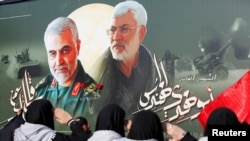The January killing of powerful Iranian general Qassem Soleimani in a U.S. drone strike in Iraq has resulted in a new reality in which Iran is deterred from attacking American assets and those of its allies in the Middle East, said the top U.S. commander in the region.
“I think [killing Soleimani] has had a significant effect in establishing and reestablishing a rough form of deterrence in the theater,” said General Kenneth F. McKenzie Jr., the commander of United States Central Command (CENTCOM) on Wednesday during a webinar at the Middle East Institute, a Washington, D.C.-based think tank.
Soleimani was a major figure in Iran’s Islamic Revolutionary Guard Corps (IRGC) who oversaw the country’s overseas military activities and its proxy forces. He was killed in Baghdad, along with several other Iranian and Iraqi militia leaders, in an operation ordered by U.S. President Donald Trump.
Days after the attack, Iran retaliated by firing about a dozen ballistic missiles at two U.S. bases in Iraq. While no U.S. service member was killed, more than a hundred American troops suffered brain injuries as a result of the Iranian response.
Since January, McKenzie said, there has been a “decline” in both direct attacks from Iran and indirect ones from its proxies, adding that the elimination of Soleimani sent a message to the Iranians that the U.S. has the capability and “will” to act.
Redline
In 2019, Iran and its proxies were accused of orchestrating attacks on the U.S. and its allies. They included the bombing of oil tankers in the strait of Hormuz, the downing of a U.S. drone that had allegedly violated Iran’s airspace and drone strikes that destroyed U.S. ally Saudi Arabia’s oil installations.
None of that, however, appeared to have crossed a U.S. redline as much as the rocket attack in December 2019 by a pro-Iran militia group that killed an American contractor in a military base in northern Iraq. Soleimani was killed one week after that attack.
“They had pushed for many years to find a redline and they found a redline as the United States responded vigorously,” McKenzie said.
The U.S. general’s assessment of Iranian activities in the past six months is at odds with the initial fears that many harbored about the potential ramifications of assassinating a powerful Iranian general in a region already mired in turmoil.
Some experts continue to question the validity of the notion that killing Soleimani has enhanced the prospect for peace.
“I do not believe that the Soleimani killing has restored deterrence,” Barbara Slavin, director of the Atlantic Council’s Future of Iran Initiative, told VOA.
“There have been subsequent incidents including in March when Iran-backed Iraqi militia rockets killed two Americans and a Brit. The Iranians also used their small boats to swarm U.S. Naval vessels in April – without any apparent U.S. response,” she said.
‘Maximum pressure’
Relations between the U.S. and Iran sharply deteriorated in May 2018 when the Trump administration withdrew from a nuclear deal that was aimed to curb Iran’s nuclear ambitions.
The move was followed by the enactment of a U.S. policy referred to as a “maximum pressure” campaign, which includes imposing crippling economic sanctions on Tehran.
The initial justification for killing Soleimani was that he had been planning imminent attacks on Americans. That U.S. position, however, seems to have extended to include further boosting U.S. deterrence posture against Iran.
“President Trump and those of us in his national security team are re-establishing deterrence – real deterrence ‒ against the Islamic Republic of Iran,” U.S. Secretary of State Mike Pompeo said during a January speech at Stanford University’s Hoover Institute.
US troops in Iraq
One of Iran’s stated goals is to expel U.S. troops from Iraq. On Thursday, U.S. and Iraq will engage in a ministerial level “strategic dialogue” on the future of their relationship.
Iraqis remain bitterly divided on whether U.S. troops should remain in their country or not.
Regardless, McKenzie said he believed the Iraqi government would extend the mandate for his troops to stay and help Iraqi forces defeat the remnants of the Islamic State terror group.
Michael Pregent, a military expert with the Hudson Institute, said establishing permanent deterrence with Iran requires more U.S. military action.
“The Supreme Leader [of Iran] never thought the U.S. would take out its top general …but more needs to be done to deal with the forces in Iraq that Iran uses to attack the U.S. by proxy,” Pregent said.




